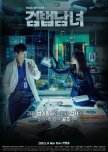
Bad copy of bad originals
You can clearly see the American influence in this production and to be honest it doesn’t sit well. This is the Korean version of CSI/NCIS and it has all the same weaknesses as the originals. Instead of the more usual focus on the machinations of internal politics, the slow unfolding of a crime, the in-depth character interactions (imo the strengths of Korean crime dramas), we have a series of crimes dealt with in one or two episodes and some two dimensional characters whose personalities have been clearly modelled on the American versions. Everything skims along the surface, with no depth and no character deviation or development.Crimes are solved in superficial and ridiculous ways in double quick-time and there’s a load of spurious criminal psychology. The convenient plot devices stack up and all credibility is trampled. The young female prosecutor seems to have inordinate amounts of time to hang around watching autopsies and never has to do anything boring like sit at her desk and work. She has a penchant for doing stupid things that get her into life-threatening situations from which she always miraculously escapes. Horrendous experiences abound with zero effect on characters who bounce back to what they were in as much time as it takes to run to the next scene. And just to increase the air of unreality, the director requires the actors to really ham it up…
If you like the style of CSI then you’ll probably like this. Personally I think it’s a really bad imitation of a bad American original.
What my rating means: 1 - 3+ Totally unbearable, but often compulsively watchable as you really can’t believe that it can be this bad.
Was this review helpful to you?
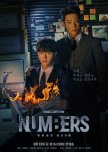
Sexed up Corporate Finance
In an imperfect world where your capital is reputation, of necessity the currency must be moral ambiguity. Honesty and compassion come at a price and the decision about who is going to pay that becomes a war of survival. This formed the core of the plot and was explored through the attitudes of the various characters who ranged from deepest black through shades of grey to the blinding light of our hero. There was not a great deal of subtlety in the exposition of this theme which often felt contrived, but it did offer you plenty to think and reflect on.This is a new angle on corruption for me and perhaps for K-drama land. The introduction of a new world requires explanations that don’t have to be made where the viewer is already familiar with procedures, concepts and terminology (for instance in the police). So the script is necessarily clunky and unrealistic as the actors are required to provide a Corporate Finance for Dummies guide to the tangled complexities of accountancy. So expect to pay attention to keep up with the threats going down in the plot. (Unless, of course, you’re a certified corporate accountant, and then you can snort and laugh your way through the inevitable distortions of drama-la-la-land.) But for most of us there will be Side Effects—머리 아프다 (my head hurts).
It gets away with a lot of OTT stuff because tbh I was concentrating so hard on what was going down that I didn’t have enough brain power to clock all the sleights of hand and magical illusions going on. But of course, we are gifted with a spectacularly clever rookie ML who manages to navigate some fairly incredible situations in this tightly plotted thriller. The end is never really in doubt, and the great reveal half way through is about as surprising as porridge for breakfast, but it manages to create a thrilling ride nevertheless. Until the ending that is. Wtf were the last two episodes? Totally random. Totally unsatisfying. Totally messed up.
I liked some of the performances in this, notably L (Kim Myung Soo) who turned in a great angry young man and Choi Jin Hyun as his sunbae. Unfortunately the female parts had less depth and relied more on caricature but the relationship between Yeonwoo and L had it’s sweet moments.
Not compulsive viewing but an honourable rating which deems it worth watching mid-week after a long hard day.
Was this review helpful to you?

A cerebral appreciation rather than an emotional enthusiasm. An intelligent watch.
If court intrigue is your thing, then you won’t get better than this. Half of the script is concerned with the delicate manoeuvring required to send indirect layered messages that have different meanings to different people, whilst the other half is concerned with bringing about the downfall of your enemies whilst keeping your hands clean. It’s an elaborate dance in which no-one touches anyone directly, but guides their steps by blocking or revealing pathways. A sinister pavane where one wrong step can lead to a blind alley, death and disaster.In a world where there is no real warmth, compassion or security,
emotional manipulation is raised to an art form and the devastating results displayed. This is contrasted with the cool, rational manoeuvring of the female lead, abetted early on by the Grandmother, which is outwardly praised as moral righteousness, but owes a great deal to power playing and more subtle manipulation. It is scheming that uses the predictable weaknesses of others to bring about their downfall. It is revenge served ice cold and does the moral character of our heroine no real favours.
In this suffocating world of just a handful of families, there is a sense of the overbearing weight of society and the machinations necessary to survive in it. In particular it focuses on the role of women and the means by which they can find and assume power, though ostensibly in a powerless situation.
The world of the men is less well crafted and believable than the domestic setting of the women. Whereas the female parts had an almost slice of life feel, the script for the men is not edgy enough. In the main their lines and performances are far too soft and “nice” for the characters that are being portrayed. No such sleight of hand was shown with the female characters and they emerge much more forcefully and credibly, triggering ambivalence in the viewer.
The overall complexity is down to a magnificent script which is full of subtlety and cleverness. Even in translation there is a clear sense of having to read between the lines and there is plenty of brainwork to be done to fully appreciate all the undercurrents. This is not the sort of thing that you approach in your pyjamas, curled up on the sofa half asleep after a long hard day at work.
I had a problem with the casting of Feng Shao Feng as the ML, I thought he was too old for the part. Unlike Kim Tae Ri who dropped some 13 years in “25-21” and totally convinced me that she was a teenager using her body language and mannerisms, FSF’s acting didn’t convincingly portray the energy of youth (my calculation was that the character was in his late twenties, early thirties at most), or the hard core determination that was his stated character. He was unconvincing as a reformed ne’er do well and ruthless soldier with a streak of rashness, and seemed more like a pleasant, middle aged burgher.
All praise though to Zhao Li Ying who was hardly ever off screen and put in a great performance as Ming Lan—the wolf in sheep’s clothing. She was more than ably supported by the other cast members and there was plenty of character differentiation to give a credible feeling of a real world dynamic. it is really fair to say that this is a magnificent ensemble piece.
It has that epic quality of “War and Peace” with a large cast of characters, grouped in families, that wonder on and off the stage when required to inch the plot forward. Everything takes a circuitous route, even, or perhaps especially, the romance. But unlike most examples, the obligatory indirectness does not feel manufactured here but natural. And the relationship of the two leads is a joy.
It was designed to be shown once a day and the slow pace of daily life would really suit this unfolding. It’s not the sort of show that you can easily binge and is better taken in smaller bites of a few episodes at a time. Because the pace is so slow the plot is almost fully realised, but occasionally there were important scenes that were papered over or not shown, leaving an unnecessary sense of dissatisfaction. Neither was I a fan of how the complete final plot line was constructed.
On the down side, it is very long and repeatedly showcases the same type of scenario. I must admit that after episode 50 I was getting a little weary and had to muster up some determination to continue. Not least because it needed a bit more variation in pace and setting to liven up the overwhelmingly cerebral work that I was doing and the plot also became fragmented and uncohesive. But it picked up about ten episodes later and proved, yet again, it wasn’t afraid of the dark side. Displaying both the physical and the mental savagery necessary to survive and thrive. But to be honest, I was flagging and found the last haul to the end a bit of an effort. I think that splitting it into two series would have helped me considerably.
Although the historical aspects are well realised, the military settings in the story are less credible and it obviously never had the budget to be an action spectacular. In the midst of such realism however, the impossible sword fights, miraculous escapes and sporting competitions (which all end without a hair or a belt out of place) stand out as somewhat ridiculous. But heh, I’m not going to nitpick here when the overall quality is good.
Cinematography-wise, the slice of life approach is beautifully realised in muted colours and subtle lighting that help to give the feeling that you are a part of the family. In the hands of lesser cinematographers and lighting designers, filming in dark interiors can appear dull and murky, but so skilful is the lighting, that the faces are always highlighted in a way that seems natural without disturbing the muted note of the surroundings. The bright colours of the costumes also lift the atmosphere and provide contrast to the browns and greys of the environment.
The soundtrack is simple and effective, supporting the historical aspect without being too literal or noisy. And a shout out to the translation team, who took the time to give helpful comments all the way through.
What my rating means: 8+ A great drama with interesting content and good writing, direction, acting, OST, cinematography. But didn’t quite have the requisite sparkle to bump it into my all-time fave list. Worth watching.
Was this review helpful to you?
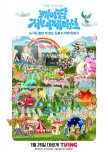
So much more than just the music
This documentary series describes the K-Pop industry from the inside through interviews with the professionals embedded within it. So they tell the story they want us to hear it and it is how they tell it to themselves. It is not designed to be an exposé, so don’t expect it to poke the vulnerable underbelly. K-Pop from the outside in gets an airing in Ep 6 but it was the least interesting episode and opportunities for insightful constructive critique were largely missed. Having said that, it is a serious piece of work that is thoughtfully structured, clearly developed and well worth watching.I first got introduced to K-Pop about four years ago, so for me this was an interesting and informative series that provoked a lot of thought. As a long-time consumer of so-called western music and the business models and culture around it, it was really helpful to get an insight like this and confirmed that you cannot look at K-Pop through a western lens, it has to be understood on its own terms. Believe me, Stock Aitken Waterman were just rugrats fumbling with Duplo compared to their contemporary, Lee Soo Man, when he set up SM Entertainment and began conceptualising and building on a Lego Masters scale.
The series reflects on every aspect of the business of K-Pop and the culture it has spawned and is embedded in. From its history to the current world of fandom, how the music is composed, the choreography designed, the idols trained. It explores the clever exploitation of the market and the development of globalisation and how that impacts and changes the domestic market and attitudes. In the final episode it opens windows onto the future and K-Pop’s place in the wider context of a world uniting through digital technology.
The impact of COVID created opportunities for agencies in the sphere of digital marketing and digital creativity. They systematically exploited them to find ways of “connecting to each other directly…that people kind of enter this K-Pop universe that they can experience and enjoy. It’s almost like an immersive metaverse but in real life.” This technological revolution is blurring the distinctions between fans and idols and pushing it down the road of the illusion of a special and “private” reality that includes AI video-game inspired group members. But it is also opening up possibilities for creating like-minded global politico-social action groups that look outwards into the real world to effect change. As one interviewee says “K-Pop agencies are actively leading the industry beyond music”.
The mental pressure on everyone, but particularly the performers, is mentioned fleetingly in Ep 3, but the response (from a sunbae idol) was to push yourself harder. The ethic of always working harder to be better and attain perfection, which is a deliberate selection criteria subsequently nurtured by the agencies, also means that they are selecting for certain types of mental health issues. As was explicitly stated in the documentary, you need to have a certain personality type to survive in this industry. Watching this soon after the tragic death of Moon Bin was particularly poignant and the failure to address this elephant in the room was a glaring shortcoming in the series.
The series provides a great deal to reflect on in terms of how music relates to and reflects the current needs and dreams of society. And how the fundamental nature of business to exploit opportunities for gain has shaped and continues to shape and expand the music industry.
Was this review helpful to you?
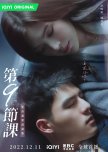
Lots to like but ultimately failed to convince
There was so much to like in this drama, the performances were good, the script was tight and the characters well drawn. The plot really held your interest and it managed some good twists, even if you could see some of them coming. But right at the heart of it was a major flaw as far as I was concerned, that undermined the whole thing. And no, it wasn’t the perceived immorality of forbidden love.The fact that Edward Chen makes such an excellent job of being an immature, bratty teenager and the writing for him is spot on, makes the romantic relationship all the more difficult to understand and believe. I simply couldn’t credit that the character of the FL would be at all interested in him as a lover. Their relationship simply did not gel for me and I had to just suck it up and move on.
Plus, it’s really hard to get past the unprofessional attitude of the FL in the drama. She behaves so badly, so often, that I ended up really not liking or respecting her at all. I don’t have to like the characters to rate the show, but when it’s a romance, it’s sort of necessary to at least warm to the lead couple.
What my rating means: 7+ A watchable drama, but nothing exceptional. Good enough to qualify for the race, but finished with the pack. The sort of thing that promises more than it delivers.
Was this review helpful to you?

The sentiments are worthy, the drama is is not
I was hoping for more from this drama with an MDL rating of 8.5 (at Feb 2023), but it failed to deliver, mainly because the writer has little grasp of how people actually talk and interact with each other—and it’s nothing to do with the subs. The script is occasionally insightful but mostly a clumsy, preachy, info-dump with totally non-credible convenient coincidences and unfathomable leaps of logic. The characters are strange, half-baked affairs that don’t have much depth to them. The overall result is chicken stock with some minuscule bits of interesting stuff floating around in it.I wasn’t that impressed by the acting either. Although with this script it’s going to be a challenge delivering the lines and nothing is helped by the stilted directing. The supporting cast were not given enough of the story line and they felt like spare parts just wheeled in to lubricate the plot when necessary. I think Hoshino Get as Shima did the most creditable job.
The writer has chosen to highlight some current social issues, and yes, they are worth highlighting. But… There is little room for the viewer to form their own opinion from what they see. Instead of sympathetic emotions arising naturally, we are told (as if we are attending a sociology lecture) in strangely manufactured voice-overs and unnatural conversations what the problem is and how we should feel about it. All too common an approach at the moment, I’m afraid. As though I can’t be trusted to come up with an appropriate empathetic response all by myself, but need to be forcibly spoon-fed a sanitised, acceptable attitude. So instead of a natural compassion flowing from me, there was just a somewhat cold, cerebral understanding. As though I’d been provided with the correct answers so that I could pass the exam.
What my rating means: 5+Meh! Don't bother, it's full of platitudes and clichés with boring characters and plots.
Was this review helpful to you?
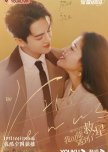
Wholesome apple pie
OK it’s no secret that I’m not fond of romcoms, but this one is good enough to win me over. (Thanks to Zogitt for the recommend.)There are absolutely no surprises and it follows the tropes and clichés to the letter. You can tick them off as they come up: random football, pretend boyfriend, mistaken identity, accidental kiss etc, etc… But that doesn’t really matter with this one because the courtship is so sweetly done, with lashings of delightful flirtatious banter.
It’s full of gentle humour and is such an easy watch to chill out to. No adrenaline rushes or cringeworthy moments, no whiny manipulation or cold arrogance—just wholesome apple pie. The two leads pull it off admirably as two people finding their way to being together as they bump over the minor speed humps placed in their way. They did the psychology right for the FL which led to some beautifully touching exchanges between the lovers.
The secondary couple are a little more stilted and less easy to ship, but engaging enough. Though I’m wondering if their scenes might have been written by an assistant writer as they have more of a pedestrian quality to them.
Basically, the script is a 12 step instructional program on how to negotiate a relationship like a grown-up. And I’m being literal here, there is quite an educational tone to it and after we’ve done the obligatory PP, it does get a bit medical education for the masses and lost me somewhat in the process. But it’s way more palatable than its companion drama, “Meet Yourself” which is basically a glacial-pace (fictional) docusoap, whitewashed nicely.
Unfortunately, about three quarters of the way through it runs out of plot and the problems get solved in the background, which was pretty unsatisfying. The script lost its edge and became very ordinary and the pace really dropped off as it bumbled along to the end.
The opening titles tell you everything you need to know about the story in bite size, so if you don’t like what you see in the first one and a half minutes, then you can duck out without wasting any more time.
Be warned, the soundtrack is not just bad, it’s abysmal. There’s an inexplicable cocktail of operatic arias, from Traviata (drinking song) through to Carmen (habanera) that don’t seem to have any relevance to the action they accompany (with a splash of Beethoven and Mozart thrown in for good measure) or, you can suffer some unbelievably naff lyrics (maybe something got lost in translation) set to hotel lobby style arrangements. And my taste in clothing is just a tad different to the ML, who gets totally swoony over an absolute shocker of a dress worn by the FL and as for her shoes, well they were just plain ugly. I suppose there’s no accounting for taste.
What my rating means: 7+ A watchable drama, but nothing exceptional. Good enough to qualify for the race, but finished with the pack. The sort of thing that promises more than it delivers.
Was this review helpful to you?

A bit all over the place, but really hit the spot on occasion
We all know the romcom/romantic drama plot beforehand, but just have to be willing to forget that episode 7 means that they will hug, episode 10 means they will kiss, episode 14 means they will be breaking up etc etc and "The Master’s Sun" is no different. Perhaps it is worth remembering, as I write this in 2022, that it is 9 years old and still watchable, which is worth a great deal and should therefore be forgiven if some of it seems hackneyed. It was probably not so when it first came out.The towering strength of this drama is So Ji Sub as The Master, Joo Joong Won. Yes he plays the standard rich, cold, arrogant ML, but he does it with a believeability rating of 10+ which outshone the Sun (Gong Hyo Jin as Tae Gong Shil) and all the other little moons and asteroids circling around it. For once, the writers gave the character a credible reason for his attitude and So Ji Sub revealed it in every scene. For the first half of the drama he was the compelling watch. Not to say that Gong Hyo Jin and other cast members gave a bad performance, but it was standard fare.
The plot was a bit all over the place. It introduced short story lines for individual episodes, particularly at the start, but that eventually became annoying as it fragmented the main thrust of the story. There were also other threads and backstory to fill out the time. Joo Joong Won’s was the best of them. The backstory for Tae Gong Shil was very badly handled.
Although the Hong sisters wrote some really enjoyable interactions, especially around the love triangle, they really did scrape the barrel regarding reasons why the leads shouldn’t really be together. Some of them were understandable, but at other times, they seemed convoluted to the point of complete confusion and I had no idea what motives the writers wanted me to pick up on. The whole of episode 16 was an annoying waste of time as we went around that loop yet again.
I wanted to give this a better rating than I eventually did because it really tried to get there, but just kept not quite reaching it. I don’t think the writing was sufficiently tight to get the dynamics right over seventeen episodes. It would have worked better with the modern tendency on platforms to commission a shorter length of 12 episodes. I will say that this drama was a far superior watch to the other offering of theirs that I have ventured into—"Alchemy of Souls," which was so badly written and directed that I dropped it!
What my rating means: 7+ A watchable drama, but nothing exceptional. Good enough to qualify for the race, but finished with the pack. The sort of thing that promises more than it delivers.
Was this review helpful to you?

A film script became a drama that works
Initially I dropped this show but came back to it later, and I’m glad I did. There’s a lot that could be better about it, but the heart of it is very good. What interested me was that a film writer (Yoo Young Ah), wrote a drama that filled 16 hours with a plot that could have serviced a two hour movie, and managed to pull it off.Movies, like short stories, revolve around one basic idea. To try and do more is actually to do less because you don’t have the space to properly explore them. So, here she takes the basic noona/chaebol romance, stripped of any excess emphasis on politics, secondary romances, plot twists (the normal complexities written into long dramas) and plumbs the depth of it. Although I don’t think the characters had enough shade written into them to give them the full three dimensions, Park Bo Gum acted his heart out and gave a a really convincing performance, particularly towards the end.
I doubt there’s anything more than that comment, insightful enough to add anything to the already abundant comments in other reviews.
What my rating means: 8+ A great drama with interesting content and good writing, direction, acting, OST, cinematography. But didn’t quite have the requisite sparkle to bump it into my all-time fave list. Worth watching.
Was this review helpful to you?

A lot to like, but flawed delivery
Essentially this is a love story set against the background of the Gwangju Uprising. It is not so much about the politics but rather a serious piece of social commentary that explores the impact on the people involved. There is a lot to like about this production that carries you through the flaws in the plotting, writing, staging and direction.The story centres around coercion on multiple levels: personal, family, business and political. We all make choices in life that reflect our response to current circumstances and when those circumstances turn increasingly oppressive the trigger point for each individual is different. Although our choices are our own to make, what we decide to do will impact those around us. At what point does the greater good triumph over family responsibilities? What is the cost to the individual if they choose family? What is the fallout if they choose the greater good? What is the tipping point, if there is one, to change from one to the other?
The drama sets up a number of scenarios to explore these dilemmas: from the nurse who has been impacted by her father’s decisions, to the student who chooses action regardless of family. The drama illustrates the human and emotional costs involved and shows that social change is only possible through the sacrifice of not only innocence but also the innocent.
The pluses of this drama are the performances, not just by the leads, Lee Do Hyun and Go Min Si, but also some of the supporting cast. Oh Man Suk was excellent as Hwang Ki Nam and had a very credible ruthlessness. Lee Sang Yi as Lee Soo Chan made a memorable impression as a good man forced to recognise and embrace reality. The lovers had a beautiful and believable chemistry and that made it easy to go along with their instant love.
There are also some very good character development arcs, as various characters get to grips with these issues. For me Lee Soo Chan, who is memorably played by Lee Sang Yi, is the best illustration of wilful ignorance to action. But others in the story are forced to come to terms with themselves in less favourable lights. There is a sense that we all would hope to be a hero, but the show reveals the courage needed just to survive, let alone take action, and does it with a certain amount of compassion.
Although the concepts within the drama are well thought through and delivered by the writer, Lee Kang, the actual structure and plotting is not always good. There are many times, particularly with the leads, where motivations are forced, or jarringly out of character, in order to serve the purposes of the plot.
The direction did little to help the lacklustre tension and was far too static and slow. It was in the mode of a romance which means it failed to do justice to the dynamics of the setting, which was in the middle of an uprising. At times we needed to see more anxiety and less stoicism. There needed to be more frequent and more marked changes of pace. This was partly the script but the greater responsibility lay with the director and how the scenes were played out and edited. Passages of dialogue in dire situations were delivered in calm measured ways, instead of urgent, desperate whispers. The editing interrupted impending threat by giving the actors all the time in the world to be romantic. It also often jumped erratically between the different scenarios leaking tension like a sponge, rather than building it in layers.
Overall, this is a good drama and well worth watching if you are prepared for patches of frustration along the way. It provides good food for thought and reveals multiple perspectives to reflect on.
What my rating means: 8+ A great drama with interesting content and good writing, direction, acting, OST, cinematography. But didn’t quite have the requisite sparkle to bump it into my all-time fave list. Worth watching.
Was this review helpful to you?

A promising fledgling trapped in a cage of romance tropes.
This drama was a pleasant surprise that exceeded my admittedly low expectations. There was a straightforwardness and believability about the writing, and the delivery of the lines by the central leads, Im Si Won and Shin Se Kyung, that enhanced the reality of the story. The attitude of the FL was credible given her background. She was written with some depth to her, unusual in romance dramas. The pressures and considerations around her profession as a translator were well illustrated and interesting. I must admit that I’m pretty hopeless at learning languages but I do have an appreciation of how a language shapes your world. After all, you can only know that you experience things that you have words for.The serious nature of the topic under discussion at the start was well treated, with echoes of DP, another drama that explores institutionalised bullying. The ML had some of the expected personality traits: cold, unresponsive etc, but he was given a credible reason for them in his background. The drama did a reasonable job of showing us the steps of his transformation without completely turning our frog into a prince charming.
The characters of the leads were non-standard for romance and they were well fleshed out and believable. With two unconventional and interesting leads one wonders whether it was necessary to have such a prominent secondary couple. The mood of the drama was more akin to “I’ll see you when the weather is fine” or “Just between lovers”, both of which emphasised the primary romance, with less than usual time given to the secondary one. We really needed to spend more time with our main couple to understand the subtleties of their interactions with each other. Sometimes the time lines were twisted and there was an inexplicable reaction happening before the motivation that explained it, which was confusing and unnecessary.
According to kdrama tweets on Twitter, (https://twitter.com/iconickdramas/status/1347390682848129025?lang=en) this is Park Shi Hyun’s first outing as a lead writer, having been an assistant writer to Kim Eun Sook who wrote “Goblin”, “Descendants of the Sun” and “Mr Sunshine”. If this is the case, Park is definitely to be commended and encouraged because it shows promise and it’s faults can at least be understood if not forgiven.
Having mentioned faults, let’s go there and explore them. I think that one source of the problem as far as I’m concerned was trying to fit a non-standard romance into a standard formula with a standard treatment. In the process the subtlety was trashed and a great deal was lost in translation. The natural flow of the story seemed to be forced in some places and stifled in others by the rigid application of standard romance tropes and editing choices. The relationship between the two leads was forced. The writer hardly gave it time to develop before pulling it apart on cue which seemed totally inappropriate for this drama. As far as I’m concerned, in order to reveal the natural development of the characters it needed it’s own non-standard form. In particular, the episodes around two thirds of the way through lacked character integrity for me.
Unfortunately we were treated to the tedious long frozen gazes that seem to plague romance dramas. Sorry, but I’m so over that style of directing and editing. I find it unnatural, weird and incredibly dated. You know that very soon it will identify an era that was very OTT and laughable. In fact it seems like that to me right now. I imagine that it is all about live broadcasting, allowing viewers to have long lingering hot-shots of their favourite crushes. But this was a Netflix series, watched on-line where you can freeze the frame yourself and gush in the privacy of your own bedroom (or whatever you want to do…). So why?
I felt that Park Shi Hyun wanted to write something different and was being constrained by outside forces to conform to a norm. The result was a strangely unsettling experience full of cliched romance production values and lip bump kisses. It really had the potential to be so much better than that.
What my rating means: 6+ Some aspects of it were OK but it had serious flaws. It will pass the time but you can find something better.
Was this review helpful to you?

It’s all in the editing…
The overall harmony required to make a stunning drama rather than a great drama is all about balance, where nothing dominates. Each aspect works with the others, so that everything blends together into a seamless whole. The final cut of this drama felt like individual soloists in a group competing for attention. The quality of the writing, cinematography, directing and acting was all really excellent, but the editing lacked the requisite harmony and balance to create a seamless, sumptuous experience. Too often, the script and actors played second fiddle to the cinematography.The cinematography in this production was admittedly stunning but way too prominent, particularly in the early episodes. So frequent are the carefully framed and composed long shots that it becomes overly self conscious. While I want to commend the striking and beautiful set shots, they caught my attention with such an impact that they drew me out of the story. This is fine occasionally, but when it is every few minutes, it’s too much. I am watching a drama, not wondering through a photography exhibition.
There was a lot of hand held camera work, close ups, tilted frames and unusual angles which followed each other in rapid succession. As though the cinematographer was trying to push every possible ounce of novelty into the available space. I’m wondering if the editing suite was then provided with a wealth of material that may not have included enough straightforward shots to edit the scene without employing a superfluity of fast cuts. Okay, I’m being generous here, it was deliberate.
Often, in dialogues between two people, the shots continuously cut between them so that you didn’t get a sense of conversation. Admittedly, it could be symbolism for some non-communication happening, but to be honest, it intruded into the flow of the dialogue to such an extent that the actors and the words seemed to be battling for attention and the meaning was lost. It had the effect of keeping the viewer at a distance, watching what was happening as an observer, rather than being drawn in.
There was extensive playing around with depth of field which created some nice effects and the out-of-focus areas added to the texture which is normally the job of lighting. Frequently the visible area of focus was greatly reduced by including blurred pillars and walls in the frame. Shot mainly in warm tones with plenty of colour in the sets and costumes the overall feel of the production was vibrant and dynamic. A good contrast was achieved between the appearance of the two companies, Barro which was assigned golds through orange to brown and Unicon in cooler blues through green, which went a long way to setting up the tension and defining their differences in approach and character.
Overall, although I welcome and thoroughly enjoy good cinematography (and there was bucketloads of that) there is a balance to be struck between all the aspects of storytelling if a drama is going to be successful at engaging its audience. Although it calmed down towards the end of the drama, the beginning was way over the top. Here it is notable that despite the imbalances, the drama was still powerful and I put that down to the scriptwriter, Kwon Do Eun.
The script is crisp, clever, intelligent and often witty (even in translation) and contained three beautifully realised and different relationships. Scarlet’s followed the norms for romance and was cute, easy and relatable, but I found much more to interest me in the other two, more mature relationships. Song Ga-Gyeong’s partnership with her husband was the most moving for me, with a poignant performance by Jo Seung Hyun as Oh Jin Woo. I really like him as an actor in general and in this performance he did a great job of conveying the inner world below the dignified surface.
The dialogue between Bae Ta Mi and Park Morgan was fresh, original and well executed and it provided the core of the romance aspects of the story. The demands that Park Morgan makes on Bae Ta Mi and the constraints he puts himself under, as well as the compromises he makes, present wonderful opportunities for building the tension (both sexual and otherwise) between them and I enjoyed their interactions and flirtations. The progression of their relationship was not, in my opinion, created by the writer for plot convenience, but represented believable aspects of their characters and reflected the real difference in their ages and dreams.
The heart of this story though, was the exploration of the relationship between three powerful and strong women and the three actors playing them gave excellent performances. If you need to thoroughly like your heroines then this is not the drama for you. With the exception perhaps of Scarlet, who is a lightweight in comparison, the other two present the ruthlessness which they had to have in order to survive and thrive. And it’s not always pretty. But that provides the interest and character development in the story and what makes it a compelling drama. The various ethical dilemmas raised in the plot serve to test both their characters and their humanity.
Much of the plot is episodic and revolves around moral issues regarding personal information and privacy. It does a good job of giving the facts in fairly credible conversations and highlights the core problems and political pressures in the internet business world. It explores the implications of the totally connected society that we live in and highlights the shifting sands of rights and responsibilities. It’s a good show to watch if you want to be stimulated to think.
The soundtrack uses of a lot of music familiar to western ears, from jazz to classical as well as some original material. In a show bursting with strong production values, this was its weakest point. There was some good stuff in the mix but not original enough to strike my ear and hold my attention.
This show isn’t about nice neat solutions, it’s about incompatible dreams and principles and ethically messy grey areas, so expect to be conflicted.
What my rating means: 8+ A great drama with interesting content and good writing, direction, acting, OST, cinematography. But didn’t quite have the requisite sparkle to bump it into my all-time fave list. Worth watching.
Was this review helpful to you?
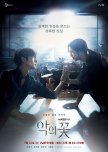
Never mind the plot, feel the production values…
There’s a ton of reviews for this show, so I don’t want to write another - wow, amazing, watch-this-show review. With that in mind I’m going to focus on the direction and production values, because they are totally awesome. If you have not already seen this show, widen your eyes and ears when you watch it. If you are re-watching, hopefully you will have enough spare capacity to take more notice of some of the stuff I’m going to talk about.In a drama like this, where the plot is complex and there are a lot of characters with conflicting motivations, first time round it was as much as I could do to just keep up and I popped out at the other end wondering why I found this show soooo amazing. Because let’s face it, the plot is not brilliant. Yes it’s got some great twists and continually finds inventive ways to keep the tension going, but it’s horribly clichéd and frequently stretches credulity like knicker elastic. Sometimes I found myself laughing when I should have been chewing my nails—not good. Whilst I was busy following the plot and being mesmerised by LJG,'s performance, all the production values were impacting me at a subliminal level creating the context for the story to come alive. I may not have always directly noticed it, but if they weren’t there, to be honest, I’d have been watching an average thriller. So I’m still going to give this show a 9 because everything but the plot is exceptional.
Let’s start with the directing. I loved the innovative way in which Kim Chul Gyu gave the viewer insight into Do Hyeon Su and elicited our empathy for him. This take on psychopathy is pretty unique and none of the usual things are going to work here. I can imagine that a lot of time and thought went into working out a way to do it. And in the end it was brilliantly achieved through close-up camera work, subtle facial movements (LJG was simply awesome here); slow motion and lack of normalising sound. Without these techniques, Do Hyeon Su would have been just another closed up, leading male and it would be difficult to credit why Chae Ji Won loved him. Kim Chul Gyu enabled the viewer to get inside Hyeon Su’s head. Sometimes, in those extreme close-ups, you could actually see LJG’s thought processes going on behind his eyes. And the sequences, particularly in the first couple of episodes, were cleverly designed to show cause and effect. In Ep 4, first date, we are encouraged to see Ji Won through Hyeon Su’s eyes, by utilising slow motion for her face and turning up the soundtrack, so that as viewers we were forced to register her facial expressions in a way that we normally wouldn’t. The effect was to share the process with Hyeon Su of working out what she was feeling and responding in kind. Brilliant!
The constraints of the plot early on worked well to curb the release of emotions and increase their intensity. This underplaying is magic and such an achievement can only be realised when a great director works in total harmony with capable actors. I don’t need to say much about the career-highlight portrayals by Lee Joon Gi and Moon Chae Won, just read other reviews for that. However, when the constraints of the plot are lifted about two thirds of the way through, imo things get a bit out of hand and there is a bucketful of crying, which is a pity. I’m such a great believer in less is so very much more. LJG has said in interviews that he felt that the melo took over at the end and the impression I got was that he wished they’d pulled it back a bit. I must admit that the whole portrayal of the antagonist Baek Hee Sung was simply too OTT for me. And the scenes involving the Baek family were the least convincing in the drama.
Moving on to the cinematography. Park Seong Yong has been involved in a string of smash hits, and that can’t be accidental or just luck. There is no doubt that he has played a part in their success. In Flower of Evil he relies heavily on photographic composition. In the first two thirds of the drama he frequently lingers on beautifully composed set shots that are lit and framed to perfection. There is a scene in Ep 8 between Hyeon Su and Hae Su set in a derelict indoor fishing facility with extensive walls of now broken glass. The scene, at night, is lit primarily from one bright, gold light-source set externally. It creates a breathtaking atmospheric beauty for this very moving scene. I mean, who would have thought to do that? Wow! And that is just one example of a thread of innovative and exquisite shots that meander like a necklace of pearls through all the earlier episodes.
The richness of the colour palette is another gem in this production. The whisky bar in Ep 9 utilises deep reds and gold, in a set that glories in chiaroscuro: hidden motives and black deeds hide in the shadows. Scenes where we see the calculating side of Hyeon Su are often filmed in blue-tinged lighting, emphasising the hard lines of the faces and bringing a sharp coldness to the overall mood.
The cinematography everywhere enhances and reveals the emotional impact of the action. The phone conversation at 10pm in Episode 10 is a beautiful example of this. When after a deeply difficult and moving scene there is a static long-shot of Ji Won alone on the wide, bare expanse of the office rooftop, with a blurred backdrop of skyscraper lights: so very small and alone with all her desperate feelings.
Throughout, the lighting echoes one of the themes of the drama; that light can be born from darkness. The overall tone of the production is shadowed, with frequent highlights of warm tones, even occasionally used for the antagonists.
The soundtrack is a masterpiece of creativity as well. Not smoothed to the point of blandness, it has a gritty, exposed texture. It reflects the dichotomy of the story from the pulsing beat and rising scale of “Psycho” to the unforgettable, haunting falsetto of “Feel You”. Often, the string section in contemporary film and game music is used for hackneyed, swelling melodies and I loved that the titles music utilised slightly grating arpeggios from the strings and layered soaring voices above them.
Overall, even with all its faults, Flower of Evil is an unique drama that offers up a feast for the eyes and ears as well as some really notable performances from all of the leads. Lee Joon Gi was beyond good and his performance alone is enough to recommend this show.
What my rating means: 9+ A drama I totally fell in love with and is endlessly re-watchable. It ticked all the boxes and had some serious wow factor. It would go on my personally recommended list.
Was this review helpful to you?
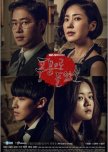
“No-one can make you feel inferior unless you give them permission.” (Eleanor Roosevelt)
If you are someone who can see through the facade to the merciless pen underneath, then you will love this drama. The writer, Jung Sung Joo, shares Jane Austen’s ability to allow characters to damn themselves through the words that emerge from their own mouths, and she reveals a feast of dangerous stupidity and ignorance, stuffed full of self importance, pompous delusion and total helplessness.The art of good satire is to clearly reveal the self interest and evil hidden behind the veil (such an apt anagram!) which the powerful draw over it. This show does that in spades. Hysterically funny at the start as it draws the lines of battle. Then it inches down the road to seriousness until, twisting the knife, the cost in suffering of the abuse of power is laid bare. However funny it is, this drama is a deeply serious comment on the use and abuse of power in a society in transition to the modern, and the underlying ruthless, self-interested principles that guide it.
The skill of the writer is so much more subtle than simply mocking and attacking. The script, in the wonderful hands of director Ahn Pan Seok, simultaneously unfolds multiple perspectives on a situation. Laughter and anger share the same space. One second judgemental, the next sympathetic towards the same character. The music (by Lee Nam Yeon) is a masterpiece of counterpoint and a character in itself, as is the suffocating environment of the house.
This biting satire on class and privilege may not make a great deal of sense to people from more notionally egalitarian societies without a history of aristocracy. The true aristocracy are not people who have wealth and power because they have made it on their own merit, or through business dealings or corruption, like the chaebol (who also feature in the story). Their wealth, power and status is totally unearned by them individually. They view it as their inalienable/natural birthright and that they are the custodians that must hand their power and values on, intact, to the next generation. Hence, Han Jung Ho’s bizarre insistence that the “children” study Machiavelli’s “The Prince” in scenes that made me cry with both laughter and despair.
Part of the humour and satire stems from the fact that the Han family is not truly aristocratic (the father is third generation nouveau riche) but they ape the values of the aristocracy. They do it with the clumsy, narrow-minded misunderstanding and thoroughness that only the aspiring can have, and in the process wreak devastating havoc on everyone else. The corrupted worship of tradition and ceremony may be ridiculous, but make no mistake, the power is real and dangerous.
The script plays on the blindness at the heart of the Han parents to the privilege that feeds their all consuming self interest. Having never known anything else they cannot think outside the box. In a wonderful moment in Ep 6, the father (Han Jung Ho) claims a spurious egalitarian credibility for himself by smugly announcing that everyone, whatever their status, shares the same style of office space in his law firm and adds, “what does being aristocratic count for these days, we’re all civilians now”. Their ignorance and ego offers much opportunity for manipulative, servile flattery which in writer Jung Sung Joo’s hands becomes a crowning work of art. Especially in the sycophantic performance of a lifetime by Kil Hae Yeon as Secretary Yang. My favourite line of hers being (in the context of imagined alopecia) “Don’t worry, Caesar didn’t have much hair either.” To which Han Jung Ho’s reply is, “Truly, you’re the only one who reads my mind.”
But behind the savagery of the satire lies a humanity that reveals how trapped the Han parents are in the vice-like grip of the world that they have created from their delusion of superiority and the personal price they are condemned to pay for continuing to uphold it.
As with the ending of Secret Love Affair, another exceptional offering by this writer and director combination, the ending is perfect. There is no trite papering over cracks, although I could have wanted the lead up to it to be better. Whoever ordered the cutting of the number of episodes late in the day is a philistine worthy of being employed at Hansong! Having said that, my only criticism is that overall the script could have done with an editor’s pencil. It is expansive in the extreme, and although it mostly holds the attention, it would have been tighter and sharper commissioned for 24 episodes, rather than the 30 it ended up being. The cast and direction are legendary and walk as close as humanly possible to the edge of the cliff without falling over.
As a piece of satire this is 20/10, but as a drama, it has a few pacing faults. I cannot recommend it enough if you are someone who likes to be challenged to think when watching. It is a superb piece of drama.
What my rating means: 9+ A drama I totally fell in love with and is endlessly re-watchable. It ticked all the boxes and had some serious wow factor. It would go on my personally recommended list.
Was this review helpful to you?
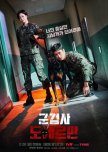
Too reliant on cheap tricks to really shine
If you want an easy laugh, an abundance of twists and don’t care too much about credibility or depth, this show may well suit you. But if you are looking for something more sophisticated, challenging and suspenseful it will disappoint.Okay let’s start with some of the good stuff before weighing in with the problems.
Such a cool sound track. I think this is my favourite soundtrack so far from all the dramas I’ve watched. The opening credits track really remind me of “The The”. The vocalist has a similar vocal style. Even the title font and colour felt like a graphic nod in that direction. Is this just me? Overall, the rest of the OST has got some great voices, with gritty undertones and pulsing instrumentals.
The military setting was a strong point, allowing for the investigation of a number of scenarios around the abuse of power and authority which offered a different slant from the more normal political or business environment. It examined some really good issues that had a lot of potential.
Do Bae Man was a quirky character well executed by Ahn Bo Hyun, although in the later stages I think he lacked subtlety. Jo Bo Ah as Cha Woo In also made a sound job of the action scenes. Oh Yeon Soo was less persuasive as their arch nemesis, Noh Hwa Young, for me she didn’t quite convince in the steely coldness that the role demanded. I thought that Kim Woo Seok gave the best performance as the damaged and unstable Noh Tae Nam and his screen time made for compulsive viewing.
This is a show of two halves. The first half is much lighter and quirkier than the second half. At first, there was a great mixture of the believable and the ridiculously unbelievable. I liked the way the writer managed to keep you clinging to the edge of credibility before tipping you over the edge. However, on a number of occasions, ridiculously unbelievable was not the writer’s intent and it really cast a shadow of stupidity and incompetence over the protagonists. That they would not properly protect vulnerable, mission-critical witnesses for instance. This is short-cut, sloppy plotting that requires manipulating the integrity of the characters. Of all writing faults, for me, this is the one that is absolutely unforgivable. Your characters are your connection to your audience, undermine them at your peril.
The one thing that this writer excels at is twists and there are some absolutely classic ones, along with a few oh-dear-whoops moments that completely cracked me up. The one at the end of Episode 7 was brilliant and showcased the vein of black humour running through this production.
However, a primary fault is its inability, particularly in the early stages to build sufficient tension. The blame can partially be laid at the door of cheap tricks to grab the attention, rather than systematically building suspense that carries the viewer with it. Particularly in the first half the writer allowed himself to get distracted by making a joke or trying to look cool, rather than making a point and again character integrity was compromised for the sake of a passing punchline.
Throughout there was all too frequent use of flash forwards and flash backs often at the start of an episode to try to peak interest. The fault might be laid at the writer’s door or maybe the director in the editing suite, but whoever did it the result is not persuasive. It’s a cheap way to get attention and smacks of covering up weak plot planning.
The mode of choice is to show the action and then tell the twist afterwards, as in a “gotcha”. This can be effective sometimes, but it is used too often here so that the viewer soon learns not to trust anything they are seeing. Instead of drawing the viewer in, it serves to alienate them, as though they are not part of the inner circle in the know. This technique is something to be used sparingly when it’s a huge twist that comes like a slap in the face. The cost for frequently using it is losing the building of suspense that the viewer does for themselves in anticipation of what might come.
Overall the plot lacked drive and coherence, jumping from scenario to scenario, with way too many plot threads. This meant that some of the serious issues aired in the second half of the drama were explored in less depth than they really deserved. Whereas more minor ones were left dangling for long periods only to be picked up again as a convenience. There was an awful lot to try and pack into the drama, a more in-depth exploration of either the corruption or the social issues would have made a full length drama and I felt that trying to do both meant that neither was fully done justice. The resulting shortage of time lead to a naive, fantasy land treatment of many of the complex issues, for instance, the development of a new weapon.
It’s a necessary skill for a writer to work out how to dump info without requiring the actors to do it for them in unrealistic and clumsy conversations. This is a skill not yet mastered by Yoon Hyun Ho and there are way too many pedestrian lines for the actors to say that slow the pace and muddy the credibility. Later on, there is a shortage of sophistication in the playing out of scenarios, including the legal ones, and the script is amateurish. That injuries on someone’s back from a beating could somehow be construed and accepted as self-harm is ludicrous.
The script was not helped by the lacklustre directing and the choices in the editing suite, which served only to disjoint further, rather than unify the disparate pieces of the plot.
The FL, Cha Woo In, says at the end of Episode 1 “A world where justice and truth have been reversed. Only from upside down can you see it properly.” Which has echoes of the twist in perspective of this writer’s previous offering, “Lawless Lawyer”. I like the sideways approach that he takes, he has good ideas and themes worthy to be explored, it’s just the execution of them that is sadly lacking.
What my rating means: 7+ A watchable drama, but nothing exceptional. Good enough to qualify for the race, but finished with the pack. The sort of thing that promises more than it delivers.
Was this review helpful to you?


 3
3 2
2
















